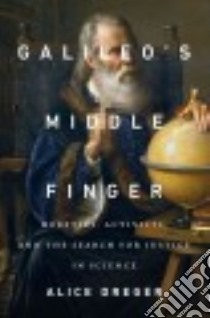Galileo's Middle Finger - 9781594206085
Un libro in lingua di Alice Dreger edito da Penguin Pr, 2015
- € 25.00
- Il prezzo è variabile in funzione del cambio della valuta d’origine
A powerful defense of intellectual freedom told through the ordeals of contemporary scientists attacked for exploring controversial ideas, by a noted science historian and medical activist
An investigation of some of the most contentious debates of our time, Galileo’s Middle Finger describes Alice Dreger’s experiences on the front lines of scientific controversy, where for two decades she has worked as an advocate for victims of unethical research while also defending the right of scientists to pursue challenging research into human identities.
Dreger’s own attempts to reconcile academic freedom with the pursuit of justice grew out of her research into the treatment of people born intersex (formerly called hermaphrodites). The shocking history of surgical mutilation and ethical abuses conducted in the name of ?normalizing” intersex children moved her to become a patient rights’ activist. By bringing evidence to physicians and the public, she helped change the medical system.
But even as she worked to correct these injustices, Dreger began to witness how some fellow liberal activists, motivated by identity politics, were employing lies and personal attacks to silence scientists whose data revealed inconvenient truths. Troubled, she traveled around the country digging up sources and interviewing the targets of these politically motivated campaigns. Among the subjects she covers in the book are the anthropologist Napoleon Chagnon, falsely accused in a bestselling book of committing genocide against a South American tribe; the psychologist Michael Bailey, accused of abusing transgender women; and the evolutionary biologist E. O. Wilson, accused of fomenting rightwing ideas about human nature. Galileo’s Middle Finger describes Dreger’s long and harrowing journey back and forth between the two camps for which she felt equal empathy: social justice warriors and researchers determined to put truth before politics.
As scientific discoveries increasingly complicate our traditional ideas about human identity and behavior, Dreger poses an urgent question: How do we balance social justice and scientific freedom when these ideals seem to be in open conflict? As she shows was the case with Galileo, in spite of how scientists and activists may think their values differ, justice and truth are inextricably bound up. Galileo’s Middle Finger ultimately makes the case for treating the quest for evidence as essentially sacred, and doing so specifically to advance justice.
Informazioni bibliografiche
- Titolo del Libro in lingua: Galileo's Middle Finger
- Sottotitolo: Heretics, Activists, and the Search for Justice in Science
- Lingua: English
- Autore: Alice Dreger
- Editore: Penguin Pr
- Collana: Penguin Pr (Hardcover)
- Data di Pubblicazione: 10 Marzo '15
- Genere: SCIENCE
- Argomenti : Science Moral and ethical aspects Science Political aspects Scientists Professional ethics
- Pagine: 337
- Dimensioni mm: 234 x 155 x 0
- EAN-13: 9781594206085


